The early years of Super Rugby were marked by the sport’s transition into high scoring; a phenomenon the game had never seen before on any consistent basis.
It was as if unshackled players were celebrating their new-found professional status; being paid to do something they loved and would gladly have done for free.
There was more to it. Professionalism also brought superior playing surfaces, better conditioning and more time to work on attacking skills, and an understanding from all in the game that, as a professional sport, rugby was also in the entertainment business.
Predictably, there opened up a north/south divide, with many observers in the northern hemisphere ridiculing Super Rugby as little more than ‘touch’ or ‘defence-optional’ rugby; if you like, the equivalent of T20 to Test cricket.
That battle was comprehensively won by the south, with New Zealand, South Africa and Australia winning eight of nine World Cups held to date; five of six in the professional era.
Notably, fears that a north-dominated IRB or World Rugby would shape the laws of the game to rein in the free-running south, proved to be unfounded. Match officiating is as close to being ‘borderless’ as is possible, and the focus of lawmakers has, for the most part, been exactly as it should be – to retain the essence of rugby as a contest for the ball, whilst favouring continuity of play.
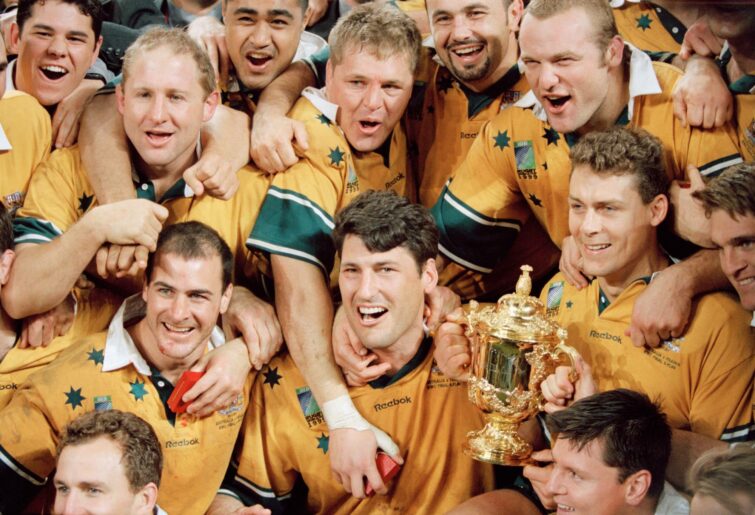
Australian captain John Eales (C) and his teammates celebrate after winning the 1999 Rugby Union World Cup final against France. Australia won the final 35 to 12. (Photo by Franck Seguin/Corbis/VCG via Getty Images)
In truth, the differences were never as pronounced as what they were made out to be. The great Welsh sides of the 1970s, were as entertaining and exciting to watch as any in the history of the game, for example.
And in more recent years, the English Premiership has taken on the same attributes as Super Rugby; a focus on attack, with frequent forty-something to twenty-something score-lines that mirror what happens on the other side of the world.
It’s not all about attitude, either. Two aspects where laws favour teams who execute efficiently are the attacking five-metre lineout maul, and the ability to generate lightning-quick ball (LQB) from repeated attacking phases, which can make it very difficult for defences to set themselves.
Get these things right, and points will invariably flow.
All of which makes events of the weekend all the more noteworthy; two matches dominated by defence, won the old-fashioned way.
The ‘in the trenches, sleeves rolled up, head-down, arse-up, in-your-face’ kind of attrition that, while it may scare the living daylights out of those wanting to market rugby as entertainment – whatever that actually means – warms the hearts of those who lived and understood the game as something meatier than just a high-scoring romp.
It is this factor that makes the Reds’ 25-22 win over the Chiefs in New Plymouth all the more remarkable. Not because the Chiefs were unbeaten and unbeatable, or because the Reds of recent times have resembled a shapeless jumble of individuals stubbornly refusing to gel as a single, cohesive unit.
And not because the Reds had suffered 21 straight losses in New Zealand, dating back to 2013.
But because Super Rugby so rarely looks like this anymore.
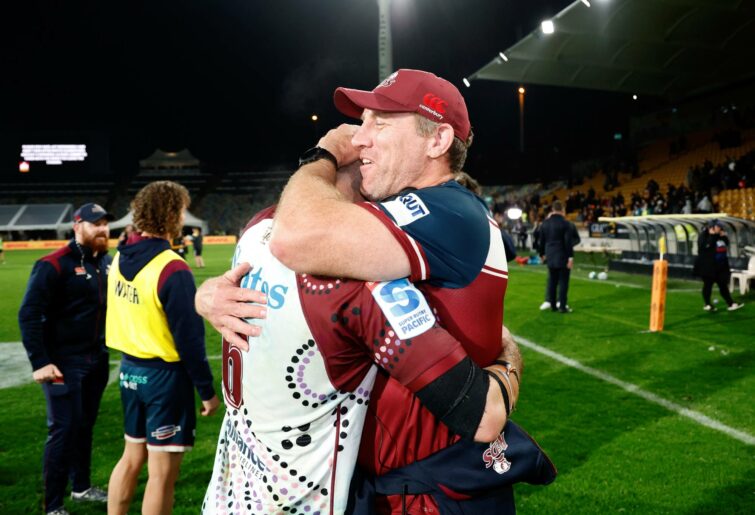
Liam Wright of the Reds celebrates with head coach Brad Thorn (Photo by Andy Jackson/Getty Images)
The Reds committed to competing at the breakdown all night, harrying young Chiefs halfback Cortez Ratima off his game, allowing their defensive line front-foot collision opportunities in midfield, that were routinely accepted.
It helped that the Chiefs never first sought to earn the right to go wide, missing the pragmatism of Sam Cane and the bull-at-a-gate directness of Samisoni Taukei’aho. The home side was also guilty of grubbering too much ball away when sweeping into attack; something the Blues would also be guilty of the following night.
But none of that is to take gloss off the Reds’ effort; resolute in both its focus and execution, tailor-made for a grafting player like Connor Vest, for example, to take his game to a new level.
The final, excruciatingly elongated period of play – 25 phases long after the final siren – will go down in Reds’ rugby folklore; absorbing and repelling everything the Chiefs were throwing at them, having declined penalty advantage to kick for a draw, in order to win the match with a try.
In the end it was Chiefs’ hooker Tyrone Thompson who blinked; channelling his inner Cabous Eloff, trying to burrow over the try-line without a realistic chance of forcing the ball, being swallowed up by a defence that had no intention of being denied.
What added to the drama was the fact that the Reds were defending only a three-point lead, when it should have been seven. Tom Lynagh’s conversion miss from Zane Nonggor’s try was a bad one, while earlier, Lachlan Creighton suffered the rare misfortune of having his conversion attempt from almost in front, waved away, when the ball fell off the kicking tee after he’d begun his run-up.
After five years in the hot seat, Brad Thorn’s time with the Reds is up. Critics rightly point to the Reds’ 2021 Super Rugby AU triumph not being the springboard to better things it promised at the time, but a lower-than-acceptable high point. This win aside, the Reds are demonstrably no better now than they were during that competition.
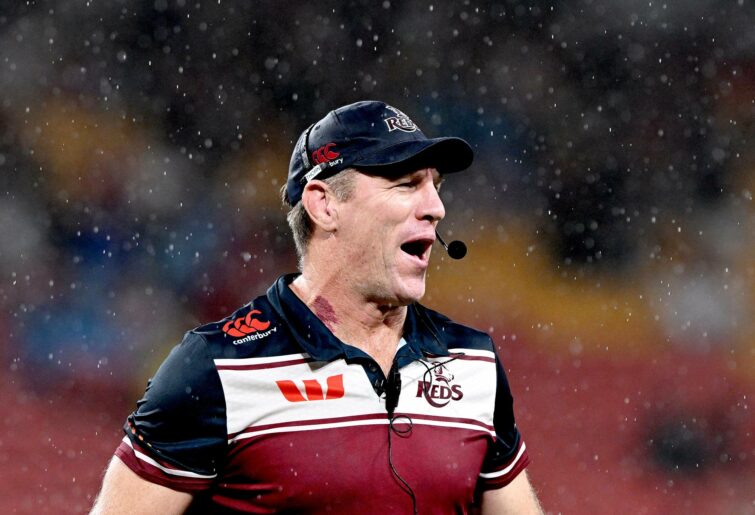
Brad Thorn is set to stand down as Queensland Reds coach following the 2023 season. Photo: Getty Images
But nobody could watch this match, and the scenes that played out after the final whistle, and not feel happy for Thorn. Hs is a man who knows in his heart of hearts that his players are playing for him and each other, and who, when things come together as they did here, can do the Reds’ jumper justice.
Full credit to Vest, Seru Uru, Liam Wright, Tate McDermott and others for their sterling defensive efforts. But it wasn’t hard to imagine Thorn on the pitch in amongst the action, urging his players to follow his lead, getting down and up in repeated efforts, knocking over attacker after attacker, to secure the win.
Defence also dominated proceedings in Christchurch, with the 15-3 win to the Crusaders equalling the Blues’ lowest score in Super Rugby.
In the vast majority of matches, keeping the opposition to 15-points would be a winning achievement, and the Blues scrambled impressively throughout, to keep the scoreboard in check, despite being under an immense territorial and possession deficit.
The trouble was, living off scraps as they were, the Blues never really threatened to score points themselves, with the Crusaders equally adept at recognising where their attacking threats lay, and snuffing them out with their own defensive clamp, well before the Blues had a chance to hurt them.
The Crusaders won because they demanded the match be played on their terms, although at 10-3 at half-time, they were only one slip-up away from having all their good work undone. It needed something special to break the game open, and when it came, it was a double blow that sealed the deal.
Creativity from Braydon Ennor and David Havili – who is firming by the day to retain his All Blacks’ 12 jersey – opened up an opportunity for the irrepressible Leicester Fainga’anuku to finish. As an aside, if Suliasi Vunivalu is wondering about what he might need to do to cement a spot in the Wallabies, all he needs to do is watch and learn from Fainga’anuku’s contribution in this match.
The double blow came as a result of a review of the lead up, where Richie Mo’unga was collected high by Blues’ skipper Dalton Papalii, and where there was never a doubt that Papalii’s on-field yellow card, would be upgraded to red.
Dreadfully unlucky to lose earlier in the year to the Crusaders in Auckland, the Blues could have no such complaint this time around. As good as their own defence was, the Crusaders’ defence was better. Nevertheless, they remain close to the mark, and will be a genuine contender in the finals.
Over in Perth, referee Angus Gardner was so disappointed that halfback Frank Lomani fed the first scrum, instead of being allowed to feed it himself, that he missed sight of Drua lock Te Ahiwaru Cirikidaveta’s first-half touch-down. But in a perfect example of how far the review process has evolved, TMO Kyle Burnett was able to pick this up off-camera, quietly draw it to Gardner’s attention, and, with a minimum of fuss, embarrassment or player dissent, correct the decision.
On their way to a 34-14 win, there was a lot to like about the Force’s 9-10-12 axis of Isaak Fines-Leliwasa, Max Burey and Hamish Stewart, with Burey, in only his second week in the driver’s seat, particularly impressive in the way he attacks the ball with square shoulders.
It’s always easy in hindsight, and the Waratahs can’t contract everybody, but with a background in Australian sevens and Shute Shield for Northern Suburbs, Burey has shown enough already for uncomfortable questions to be asked around Tah’s HQ.
Grinding defence certainly wasn’t the order of the day in Wellington, with the Hurricanes cruising to a 71-22 win over the hapless Moana Pasifika.
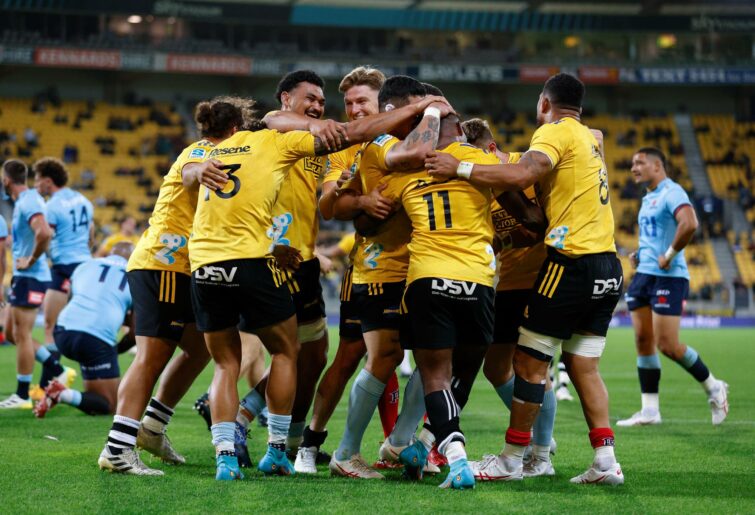
Kini Naholo of the Hurricanes celebrates with teammates (Photo by Hagen Hopkins/Getty Images)
Two things stood out in this match. This was one of those games Ardie Savea could easily have chosen to sit out, in order to manage himself for the Super Rugby finals, Test season and World Cup to come.
Instead of taking the easy option of resting, or playing but dialling it in, so genuine is Savea’s love of playing the game, and the kick he gets from serving his home fans, he played at the only speed he knows how, and he was delighted afterwards with the three tries he scored.
The other point of interest was the second-half try scored by Salesi Rayasi, which came after superb support play and an interchange of passes, that last of which from an airborne Aiden Morgan, who was almost in danger of hitting his head on the crossbar, suspended over the try-line by two Moana Pasifika defenders.
In attempting to score, Morgan had attempted to dive over the top of the final defender. But if he had managed to force the ball, his ‘try’ may have been disallowed, courtesy of a law clarification made after Pita-Gus Sowakula hurdled Aaron Smith in Queenstown.
World Rugby’s definition falls under the consideration of ‘dangerous play’ and is deliberately vague, so as to leave such decisions in the hands of the match day referee. In short, a player is permitted to dive to score a try, but not permitted to jump or leap to avoid a tackle.
Ironically, by preventing Morgan from scoring, the defender only encouraged him to fire the ball back backwards, which enabled Rayasi to score instead; saving referee Brendan Pickerill from having to make a curly decision.
In a crucial game to determine the finals match-ups, the Waratahs deservedly prevailed over the Rebels, 38-20, despite the Rebels looking a class above during a first-quarter, Carter Gordon inspired blitz.
The Waratahs impressively absorbed all that was thrown at them, before Jed Hollaway began to terrorise both Jordan Uelese and Alex Mafi at the lineout, and their scrum began to dominate; albeit helped by an assistant referee who must have been the only person in the stadium who couldn’t see how fatigued and unwilling to hold up his side of the scrum, Harry Johnson-Holmes had become.
As the Waratah’s confidence grew, the looser the Rebels became; Monty Ioane all butterfingers in two clear try-scoring situations, Reece Hodge, for the second time in a month, starting the second half by kicking out on the full and instantly conceding momentum, and numerous players trying to spark things individually, but coughing up possession in the process.
As well as the Rebels, the big loser on the night was probably Noah Lolesio, with Eddie Jones’ two training camp inclusions both enjoying strong outings. Gordon, as well as running and distributing impressively, took every piece of what Langi Gleeson threw at him; which was plenty.
For his part, Ben Donaldson’s exit kicking was as good as any seen all year, and the way he capped the game off with a clean dash and pass for Izaia Perese’s try was pretty to watch.
The ability for sides to cleanly and consistently exit after scoring points has become a critical success indicator; as much a factor in the Waratah’s win as Josh Ioane’s awful attempt to trap a kick-off with his foot was, in leading directly to the Reds’ go-ahead penalty in New Plymouth.
It was the same tale of woe for the Highlanders in Canberra yesterday; for long periods dishing it up to the more highly fancied Brumbies, but – an incredible four times after scoring – botching their kick-off receipt and exit, allowing the Brumbies to strike back immediately, each time.
The Brumbies made heavier work of their 48-32 win than many might have expected, but the crowd enjoyed a thoroughly decent game of rugby in the sun, and the chance to see ‘10.2 seconds for the 100m-man’, Corey Toole, again show off his wares.
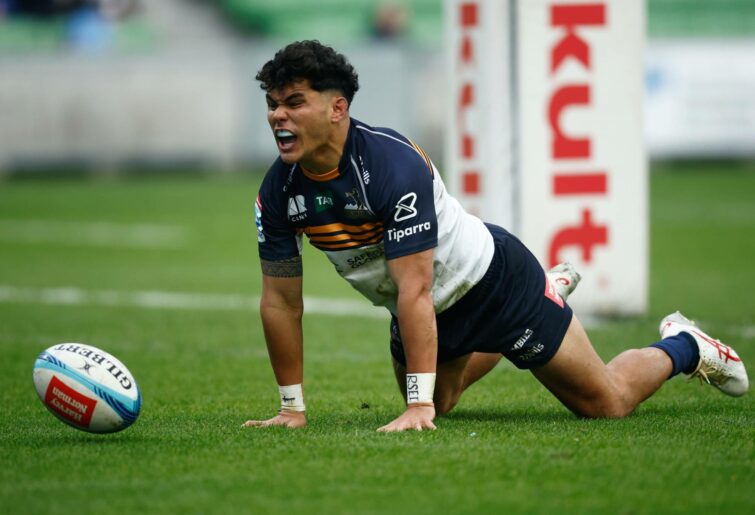
Noah Lolesio of the Brumbies (Photo by Daniel Pockett/Getty Images)
Far be it for me to spoil the fun, but before anyone goes too far over the top, Toole was defensively all at sea for two of the Highlander’s tries, and might more soberly be said to have finished all square on the day. Even so, Toole’s point of difference is unarguable, and any player who excites fans and brings them through the gate is worth their weight in gold.
With three rounds remaining, and the Reds and Waratahs having done themselves a huge favour this weekend, the Force, Drua, Rebels and Highlanders all still have their destiny in their own hands.
But with so few spots available, the noose is tightening. Which of these sides has the bravery and skill execution to score the points needed to deliver two – potentially three – more wins?
And, more to the point, which of these sides has the tenacity to defend their line like the Reds defended theirs on Friday night against the Chiefs? Whoever steps up to that plate, will continue on. Everyone else can start planning for next year.

































































































